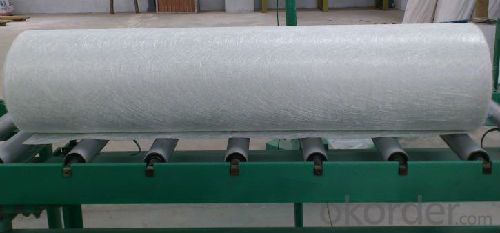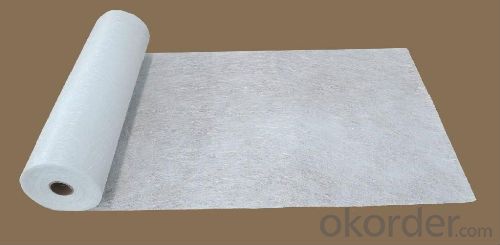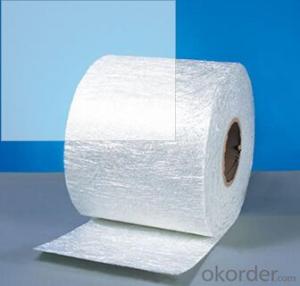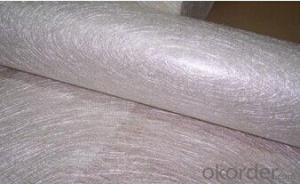C-glass Chopped Strand Mat-Powder 1000mm
- Loading Port:
- China Main Port
- Payment Terms:
- TT or LC
- Min Order Qty:
- -
- Supply Capability:
- -
OKorder Service Pledge
OKorder Financial Service
You Might Also Like
Structure of Chopped Strand Mat Description
Glass Fiber Powder Binder Chopped Strand Mat is an unwoven fabrics consisting of randomly distributed chopped strands held together with powder binder.Powder Chopped Strand Mats are compatible with unsaturated polyester, vinyl ester, phenol and epoxy resins.
The products are widely used in hand lay-up process and can also be used in compression molding and continuous laminating process and fixed table laminating process. The typical end-use applications include various panels, boats, bathroom accessories, automotive parts and cooling towers.
Main Features of E-glass Chopped Strand Mat
1.Strong bond fibers,providing high dimensional stability ans easy handing .
3.Good moldability,fast and complete resin wet-out ,enabling high productively .
4.Good transporsision and hign strength of the composite products.
5.Even thickness ,no fuzz ,no stain.
6.Fast wet-out ,products with high strength ,little loss for strength in damp situation.
E-Glass Chopped Strand Mat Images


E-Glass Chopped Strand Mat Specification:
Specs | Roll length(m) | Width(mm) | Roll weight(kg) | Compatible Resin |
EMC225 | 1040mm | 144 | 30 | UP VE |
EMC300 | 1040mm | 96 | 30 | UP VE |
EMC380 | 1040mm | 80 | 30 | UP VE |
EMC450 | 2080mm | 64 | 60 | UP VE |
EMC600 | 2080mm | 48 | 60 | UP VE |
EMC900 | 2080mm | 32 | 60 | UP VE |
FAQ of Chopped strand mat
1. Why Choose us?
CNBM is a stated own company, provide the guarantee for the best quality, best service and safety business.
2. How will we guarantee the quality?
a, ISO 9001-2008 quality control system;
b, Strict and regular quality control in production;
c, Inspeciation when loading into container before shippment;
d, Sample stock for one year for quality tracing and record.
3. What is your MOQ?
Our MOQ is one pallet.
4. Can you provide sample?
Yes, samples are in stock. we can offer free sample for you.
5. Payment terms?
We can accept L/C, T/T etc.
6. Do you offer OEM service?
Yes, we can print customers’ logo on the packaging;
And the size and specification can be produced and design according to your demand.
7. What is the Production Lead Time?
1 *40HQ each day.
- Q:Can fiberglass mat tissue be used for lightweight construction?
- Yes, fiberglass mat tissue can be used for lightweight construction. Fiberglass mat tissue is a thin and lightweight material made up of randomly oriented glass fibers bonded together with a binder. It is commonly used as a reinforcement material in composite laminates and is known for its excellent strength-to-weight ratio. In lightweight construction, where weight reduction is a key consideration, fiberglass mat tissue can be an ideal choice. Its low weight adds minimal additional load to the structure while still providing sufficient strength and durability. The random orientation of the fibers in the mat tissue ensures that the load is evenly distributed, further enhancing its strength properties. Additionally, fiberglass mat tissue is easy to handle and can be easily molded into various shapes and forms. This flexibility makes it suitable for applications in lightweight construction, such as in the production of lightweight panels, wall partitions, and roof structures. The material can also be used in combination with other lightweight materials, such as foam cores or honeycomb structures, to further enhance its lightweight properties. Overall, fiberglass mat tissue is a versatile material that can be effectively used for lightweight construction. Its lightweight nature, combined with its strength and durability, make it a suitable choice for various applications where weight reduction is a priority.
- Q:Is fiberglass mat tissue compatible with different adhesives?
- Yes, fiberglass mat tissue is compatible with different adhesives. Fiberglass mat tissue is a versatile material that can be used in various applications such as construction, automotive, and aerospace industries. It is commonly used as a reinforcement material in composites, where it is combined with resin and adhesive to create strong and durable structures. The compatibility of fiberglass mat tissue with different adhesives depends on several factors such as the type of adhesive, the specific application, and the desired performance requirements. Fiberglass mat tissue can be compatible with a wide range of adhesives including epoxy, polyester, vinyl ester, and polyurethane adhesives. It is important to consider the specific properties and characteristics of the adhesive and the fiberglass mat tissue when selecting the adhesive for a particular application. Factors such as curing time, viscosity, bond strength, and chemical resistance should be taken into account to ensure optimal adhesion and performance. In some cases, surface treatment or priming may be necessary to enhance the compatibility between the fiberglass mat tissue and the adhesive. This can involve applying a primer or using a specific surface treatment method to promote adhesion and ensure a strong bond between the two materials. Overall, fiberglass mat tissue is compatible with different adhesives, but it is crucial to consider the specific requirements of the application and select the appropriate adhesive and surface treatment method to achieve the desired results.
- Q:How does fiberglass mat tissue perform in terms of UV resistance?
- Fiberglass mat tissue generally performs well in terms of UV resistance. It is designed to withstand prolonged exposure to sunlight without significant degradation or discoloration. However, the specific UV resistance of fiberglass mat tissue can vary depending on the quality and manufacturing process of the material.
- Q:What is the typical thickness of fiberglass mat tissue?
- The specific application and intended use determine the typical thickness of fiberglass mat tissue, which can vary. Usually, it is accessible in thicknesses ranging from 0.5mm to 3mm. The selection of thickness depends on factors like the desired strength, flexibility, and absorption properties necessary for the manufacturing of the specific project or product. Applications needing greater levels of strength and durability generally employ thicker fiberglass mat tissue, whereas thinner tissue is appropriate for lightweight and flexible applications.
- Q:Can fiberglass mat tissue be used for reinforcing fiberglass tanks?
- Yes, fiberglass mat tissue can be used for reinforcing fiberglass tanks. Fiberglass mat tissue is a thin, lightweight material that is commonly used in the construction of fiberglass products. It is designed to provide additional strength and durability to the fiberglass structure. In the case of fiberglass tanks, the mat tissue can be used as a reinforcement layer to enhance the overall structural integrity of the tank. It helps to prevent cracking, improve impact resistance, and increase the tank's ability to withstand external forces and pressure. Additionally, fiberglass mat tissue is easy to work with and can be easily molded or applied to the tank's surface, making it a suitable choice for tank reinforcement.
- Q:How does fiberglass mat tissue compare to other types of reinforcement materials?
- Fiberglass mat tissue is a versatile reinforcement material that offers several advantages over other types of reinforcement materials. Firstly, it has excellent strength and stiffness properties, providing superior load-bearing capabilities compared to other materials. Secondly, fiberglass mat tissue is lightweight, making it easier to handle and install. Additionally, it is highly resistant to corrosion, chemicals, and moisture, ensuring long-term durability. Lastly, fiberglass mat tissue has excellent dimensional stability and is not prone to warping or shrinking, making it a reliable choice for various applications. Overall, its combination of strength, lightweight nature, durability, and dimensional stability sets fiberglass mat tissue apart from other reinforcement materials.
- Q:What is the maximum temperature that fiberglass mat tissue can withstand?
- The maximum temperature that fiberglass mat tissue can typically withstand is around 600-700 degrees Celsius.
- Q:How does fiberglass mat tissue compare to cellulose insulation?
- Fiberglass mat tissue and cellulose insulation differ in terms of material composition and insulation properties. Fiberglass mat tissue is made from fine glass fibers, while cellulose insulation is composed of recycled paper fibers treated with fire-retardant chemicals. Fiberglass mat tissue offers higher R-value, meaning it provides better thermal insulation and energy efficiency. Additionally, it is resistant to moisture and does not promote mold growth. On the other hand, cellulose insulation is more affordable, environmentally friendly, and provides better sound insulation. Ultimately, the choice between the two depends on specific insulation needs, budget, and environmental considerations.
- Q:What is the composition of fiberglass mat tissue?
- Fiberglass mat tissue, also referred to as fiberglass mat or fiberglass veil, comprises a blend of fiberglass fibers and a binder substance. The fiberglass fibers utilized in its formulation are typically derived from silica, a naturally occurring mineral, and are esteemed for their exceptional strength and durability. The specific binder substance used in fiberglass mat tissue can differ, but commonly includes materials like urea-formaldehyde, acrylic, or polyester resins. The binder's function is to secure the fiberglass fibers together and provide the mat with structural integrity. Furthermore, the composition of fiberglass mat tissue may incorporate additional additives. These additives may encompass pigments, fire retardants, or coatings, contingent upon the mat's intended application and desired properties. In conclusion, fiberglass mat tissue is an amalgamation of fiberglass fibers and a binder substance, supplemented by other additives as required. This composition enables the material to possess remarkable strength, flexibility, and resistance to diverse environmental factors, rendering it a versatile substance employed in numerous industries including construction, automotive, aerospace, and marine.
- Q:Is fiberglass mat tissue suitable for insulation in industrial applications?
- Indeed, fiberglass mat tissue proves to be a suitable option for insulation in industrial settings. With its lightweight and flexible nature, this material showcases exceptional thermal insulation properties. Its ability to efficiently trap and retain heat makes it highly advantageous for insulating industrial machinery and equipment. Moreover, it exhibits commendable fire resistance characteristics, which are particularly critical in environments where fire hazards are more prevalent. Additionally, fiberglass mat tissue demonstrates resistance against corrosion, moisture, and chemicals, ensuring its durability and longevity when employed in industrial applications. Overall, this material's insulation capabilities, fire resistance, and ability to withstand various environmental elements establish fiberglass mat tissue as a suitable choice for industrial insulation needs.
1. Manufacturer Overview |
|
|---|---|
| Location | |
| Year Established | |
| Annual Output Value | |
| Main Markets | |
| Company Certifications | |
2. Manufacturer Certificates |
|
|---|---|
| a) Certification Name | |
| Range | |
| Reference | |
| Validity Period | |
3. Manufacturer Capability |
|
|---|---|
| a)Trade Capacity | |
| Nearest Port | |
| Export Percentage | |
| No.of Employees in Trade Department | |
| Language Spoken: | |
| b)Factory Information | |
| Factory Size: | |
| No. of Production Lines | |
| Contract Manufacturing | |
| Product Price Range | |
Send your message to us
C-glass Chopped Strand Mat-Powder 1000mm
- Loading Port:
- China Main Port
- Payment Terms:
- TT or LC
- Min Order Qty:
- -
- Supply Capability:
- -
OKorder Service Pledge
OKorder Financial Service
Similar products
New products
Hot products
Related keywords



























